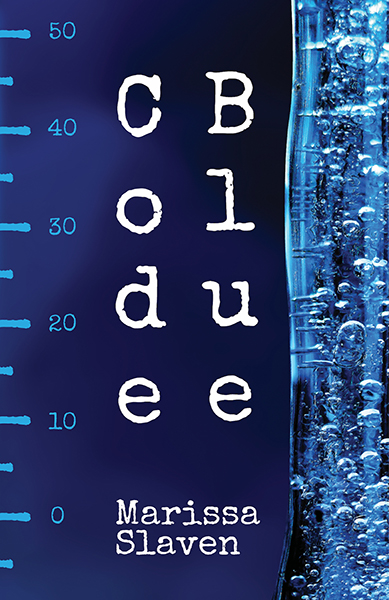
Live Encounters Magazine May 2021
 Why this Climate Scientist is my new hero.
Why this Climate Scientist is my new hero.
In Code Blue, a YA speculative eco-fiction thriller mystery, inspirational and likeable heroine Atlantic (Tic) Brewer is a climate scientist student trying to save the world: not because she is brave, can shoot arrows or jump off trains, but because she is smart.
Set in the not-so-distant future, when rising temperatures and sea levels have dramatically reshaped our world, author Marissa Slaven has created a powerful page-turner that keeps you hanging on every word. Styled very uniquely and structured with exam questions about climate change in a futuristic world, Code Blue acts as a panacea to teens and young adults faced with a global phenomenon—the sudden onset of natural disasters such as we have experienced around the world: floods or fires or a pandemic—that contributes to stress, depression, and anxiety combined with a sense of disempowerment, helplessness or resignation. But rather than lose hope, Tic and her friends find multiple actions and solutions to address this complex problem in a clear and engaging dialogue that is far from eco-preachy.
Tic is a very accessible character that leaves readers space to believe that the girl helping to save the world from climate change could be them. She’s not a super-genius, but she does have an automatic reflex to help others, which originates from her deceased fathers’ commitment to making life meaningful. Slaven hasn’t overlooked any of the challenges faced by many young people who on a personal level still worry about their immediate futures: Can I get into the college I want? How will a changing climate change our home, our lives?
Before attending the North East Science Academy, Tic went to a small high school where she didn’t have a lot of friends. Life is incredibly tough for her, but her sense of empowered optimism and emotional resilience shines as bright as a beacon. Tic goes through the same growing pains as any modern-day teen or young adult—romantic uncertainty, concerns about family, and having to deal with loss and grief. And, in a contemporary society, this young woman also faces big worries about global warming—only, in her time, it’s much worse than now. Through Tic’s struggles to figure things out in the apocalyptic place surrounding her, she offers an important message to today’s young adults who wish to lead the way into a more positive future.
The year the story takes place is not specified, a clever ommission that doesn’t detract from the urgency of a changing climate but gives hope to readers that our planet can still be life supporting in 20 to 40 years from now until deep into our future.
Many parallels and overlapping themes exist between the author’s palliative care work and the novel. As the world has recently had to accept and adapt to a life-altering pandemic, in Code Blue the world has accepted that the “Change” is both very real and a profoundly serious threat to humanity. Faced with an ever-worsening climate situation, the characters are most often centered around preservation of dignity and love, and rather than lose hope they work together to try to achieve the best possible outcome for all of humanity.
Code Blue is the type of story we all need right now. Whether the issue is climate change, or something else altogether, like socio-political issues (1984 or The Handmaid’s Tale), stories like this connect us to our worries in a deep visceral way. Certainly, facts and statistics are important, but so much of what motivates people to action occurs at an emotional level. Code Blue maneuvers our biggest environmental crisis into a palpable understanding of the human condition within planetary risk, and does that so well.
In a most uplifting and refreshing way, Code Blue appeals to all ages, including adults like me. Perhaps we all find parts of ourselves in Tic Brewer.
Coming soon from https://stormbirdpress.com/
Marissa Slaven was born and raised in Montreal by parents who taught her that it was her responsibility to do her part to make the world a better place. She has been helping people in her role as a palliative care physician for twenty-five years and she continues to get great satisfaction from this work. She is the mother of three grown children and two dogs. She has always enjoys reading books of multiple genres and frequently has two or three books on the go at the same time. She especially loves stories with strong female characters and was searching for a YA novel where the heroine saves the world using her intelligence and compassion. She was inspired by her daughter to write Code Blue, an eco-fiction thriller, where a teenage girl and her friends battle climate change. Marissa took courses at Humber college where she honed her writing skills. In the process of writing the novel, Marissa taught herself about the climate crisis. She became a passionate climate activist and continues to both write and try to do her part to make the world a more sustainable place for all living things. Marissa loves interacting with her readers and speaking with young people about the environment. She recently completed Code Red, the sequel to Code Blue, and is working on a non-fiction account of her great-uncle’s involvement in the Spanish Civil War.
Mary Woodbury, a graduate of Purdue University, runs Dragonfly.eco, a site that explores ecology in literature, including works about climate change. She writes fiction under pen name Clara Hume. Her latest work, Bird Song: A Novella is a twist on Greek mythology, a climate change parable, a coming-of-age story, and a tale of weirdness. Mary lives in Nova Scotia and enjoys hiking, writing, and reading.
© Mary Woodbury


 Why this Climate Scientist is my new hero.
Why this Climate Scientist is my new hero.